College of Human Sciences
SHIP on a quest to curb teenage pregnancy in Limpopo
The School Health Integrated Programming (SHIP) team from the Department of Health Studies in the College of Human Sciences recently visited Setuka Secondary School, situated in Mogoto Village, Zebediela.
This visit was done in collaboration with non-governmental organisations (NGOs) such as Youth on the Move in the district, owing to the prevalence of teenage pregnancy in the school, which has a negative influence on academic performance. The school has about 270 learners and offers commercial subjects. The team held a meeting with the school management to obtain an overview of the school operations, statistics of pregnant teenagers, and challenges related to teenage pregnancy and teaching and learning.
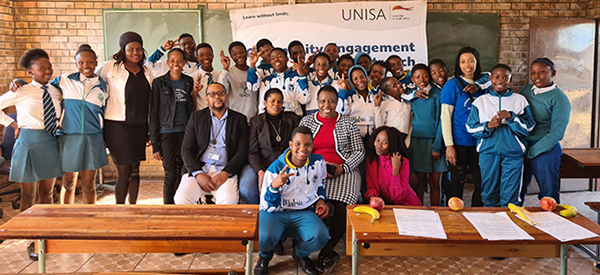
The School Health Integrated Programming (SHIP) team from the Department of Health Sciences with learners from Setuka Secondary School, situated in Mogoto Village, Zebediela.
Cacious Ledwaba, the Deputy Principal at Setuka High School, expressed his appreciation for the effort made by the university to consult the school on this important topic. "Teenage pregnancy is a serious challenge in the school, and we are trying hard to manage the situation," he said. "As we speak, we have pregnant teenagers in each and every grade."
Open discussions were held with teachers and learners about adolescent pregnancy, contributing causes, the dangers of being pregnant at a young age, the impact of teenage pregnancy on education and quality of life, and preventative measures. The NGOs expounded on the community activities that will be performed to keep the students engaged and focused on their academics, such as raising awareness about adolescent pregnancy and raising funding for the construction of a library.
Prof Rebecca Risenga, SHIP leader from the Department of Health Studies, spoke on the significance of knowledge in relation to sexual activities, especially among young teenagers who may be facing multiple difficult challenges in the schooling context. She said that the risks associated with teenage pregnancies are enormous, and range from education interruption to health risks like HIV, premature birth and increased maternal mortality, all of which deny young girls the right to live healthy lives. She said that, unfortunately, continuous teenage pregnancies will lead to intergenerational poverty as well as poor education if nothing is done to overcome these challenges. She believes that it takes the community to raise a child. "Therefore," she continued, "partnerships between Unisa and the NGOs as well as communities-based organisations in Limpopo can bring about change that may have long lasting positive impact into the future of the community members, especially young women."
Encouraging NGOs in the community, Risenga emphasised that more needs to be done with regard to sex education in schools, because of the high number of pregnancies that are seen there. She said that learners should be monitored and motivated to stay in class and abstain from or delay sexual activities, and always make use of condoms correctly and consistently. "This is a pivotal role which NGOs can play in partnership with schools, parents and community leaders to help combat teenage pregnancy," she reiterated.
Speaking more on the organisation, the leader and founder of Youth on the Move, Sharon Ledwaba, reiterated the commitment the organisation has to the project and thanked Unisa for bringing this to the NGO’s attention. She mentioned that the organisation has a network of various institutions that can assist schools to deal with the teenage pregnancy problem. She further mentioned the specific support from the royal family in the area that has the ability to mobilise community members, including parents, in imbizos to try tackle this challenge. "As an umbrella host for various organisations in the area, Youth on the Move will empower young and upcoming organisations to continue working in this field," she concluded.
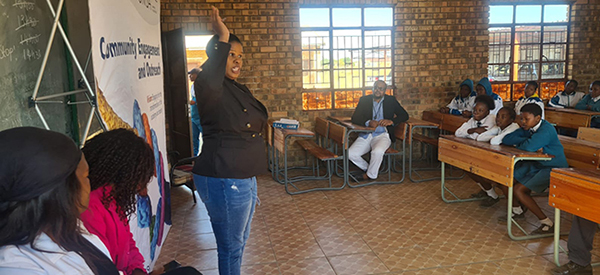
Dr Rakgadi Malapela, member of SHIP, conducted one-on-one sessions with pregnant learners to identify the challenges they face
Following up on empowerment was Dr Rakgadi Malapela, who conducted one-on-one sessions with pregnant learners to support and identify the challenges faced by them. Learners showed a positive response towards their future plans, and expressed the need for a career exhibition offered by the university. Because of resource challenges, they further requested that the university should organise a day during the application period to assist them with application for admission.
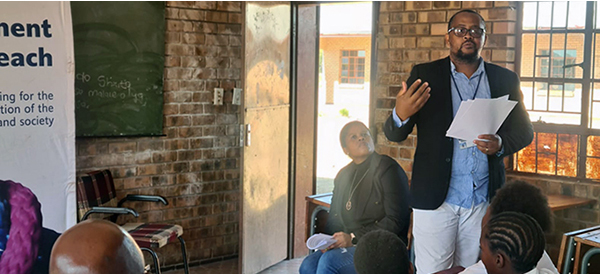
Dr Sibusiso Zuma, member of SHIP, engaging with learners
The SHIP team focused on a number of organisations in a two-day workshop to empower them.The team facilitated a workshop for various NGOs on the purpose of SHIP-engaged scholarship, communication and parenting skills, and identification of school and adolescent health needs, by applying the scientific nursing process. Focus group discussions were held with NGO members to deliberate on challenges related to teenage pregnancy and strategies to reduce teenage pregnancy. Five NGOs were in attendance and their objectives were as follows:
- Youth on the Move: To raise awareness about teenage pregnancy, gender-based violence and substance abuse by offering a mentoring programme for our boys and girls, playing an umbrella role for all subsequent organisations.
- Goddesses of Grace Foundation: To eradicate social ill in the community on teenage pregnancy by providing mentorship programmes to the youth
- Free Us Community Organisation (FUCO): To offer community and school-based sexual and reproductive health (SRH) services
- Future Families: To offer mentorship programmes to youth aged between 15 and 24 years, amongst others "NO-MEANS-NO", and focusing on sexual and reproductive health, gender-based violence and HIV.
- Ray of Light community project: To offer career expos for grade 10–12 learners, motivational talks to teenage girls and pads to girls in the community. They are collaborating with other organisations to overcome issues faced by teens
These collaborations underscore the project’s commitment to ensuring impact after implementation of the project. Organisations are, by association, contact pathways to communities and they understand most of the challenges that affect the communities.
#Unisa150
* Submitted by Stanley Namakhota, Student Liaison Officer, Office of the VP: Teaching and Learning, Community Engagement, and Student Support
Publish date: 2023-08-30 00:00:00.0

 Accounting pundit appointed to lead Unisa's College of Accounting Sciences
Accounting pundit appointed to lead Unisa's College of Accounting Sciences
 World Social Work Day: A shared future for transformative change
World Social Work Day: A shared future for transformative change
 Unisa partners with Palabora Mining Company to create research-based solutions
Unisa partners with Palabora Mining Company to create research-based solutions
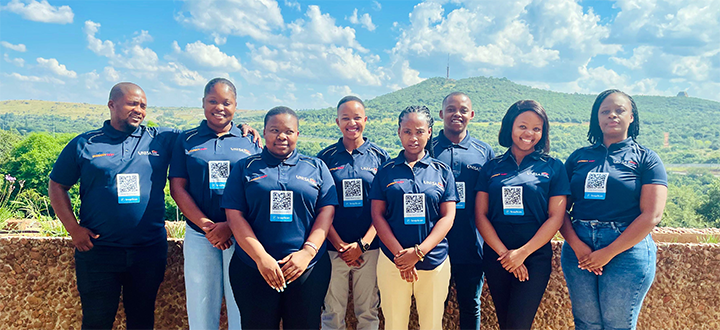 Unisa’s student leadership takes debt bull by the horns
Unisa’s student leadership takes debt bull by the horns
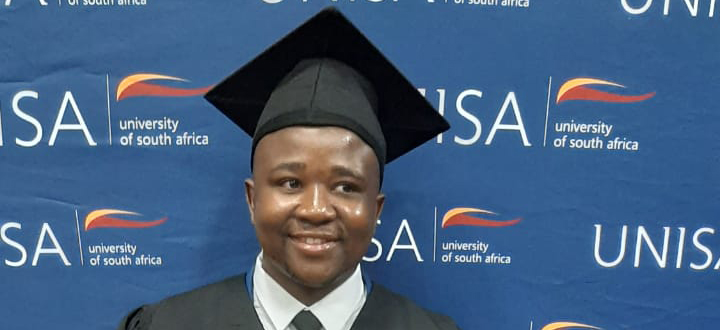 From medical scrubs to legal robe
From medical scrubs to legal robe